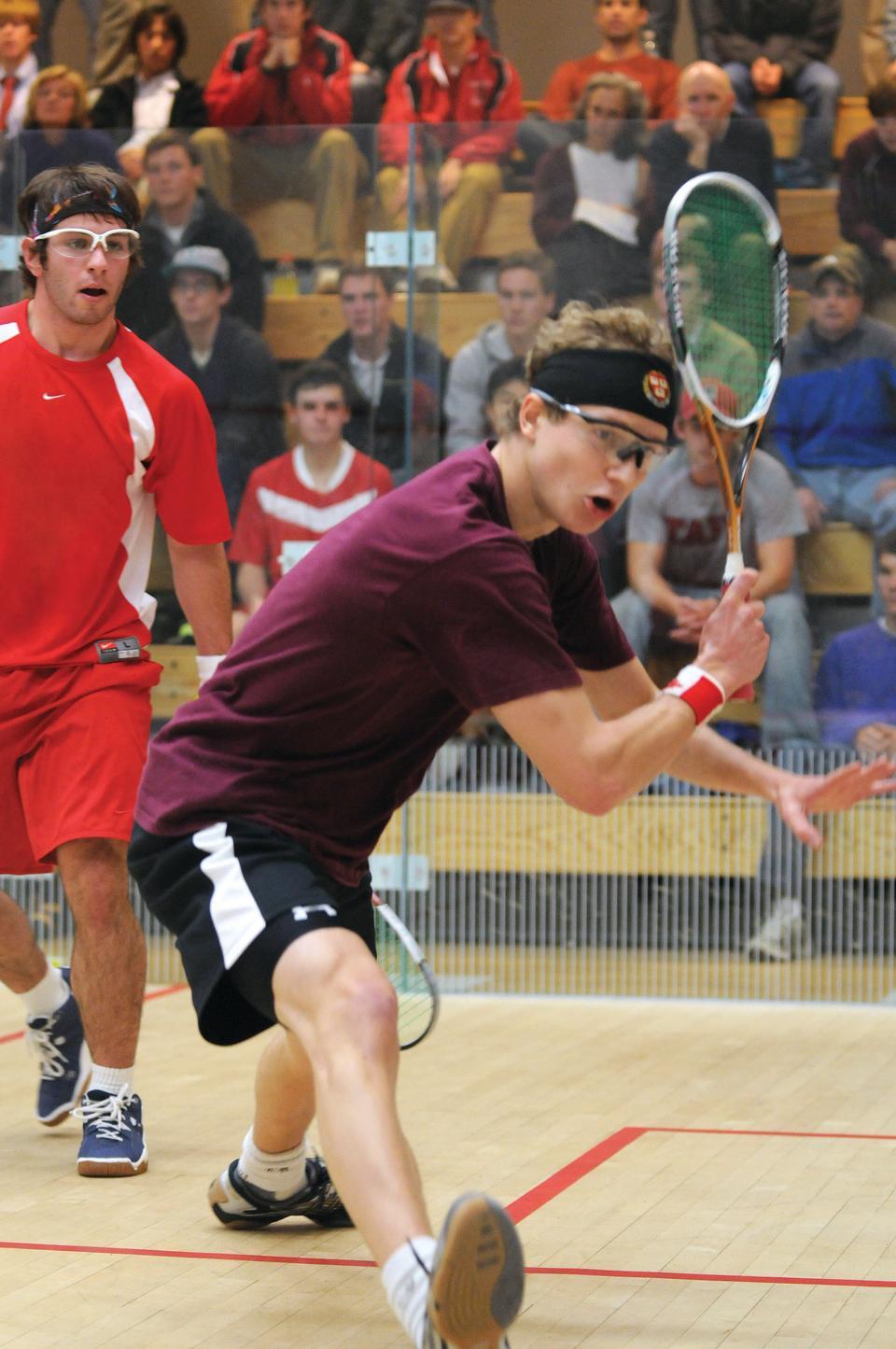
News
Summers Will Not Finish Semester of Teaching as Harvard Investigates Epstein Ties

News
Harvard College Students Report Favoring Divestment from Israel in HUA Survey

News
‘He Should Resign’: Harvard Undergrads Take Hard Line Against Summers Over Epstein Scandal

News
Harvard To Launch New Investigation Into Epstein’s Ties to Summers, Other University Affiliates

News
Harvard Students To Vote on Divestment From Israel in Inaugural HUA Election Survey
West Pumped Up For Tournament

Until last Friday, Colin West had his sights set on one thing: a rematch with Trinity’s Baset Chaudry, the nation’s top player and West’s longtime rival, in the finals of the College Squash Association Individual Championships.
West and Chaudry, both seniors, have played each other numerous times between intercollegiate competition and other tournaments, although West has yet to beat Chaudry in a CSA match.
“He’s been my main rival throughout college squash,” West says. “I’ve actually never beaten him in a match that’s counted, but its gotten closer.”
However, after Chaudry taunted a Yale player at the CSA National Team Championships in an incident that drew the attention of the national media, he announced Friday that he would not compete in the individual championships, leaving West as the likely No. 1 seed and tournament favorite.
The controversial incident occurred just after Chaudry had beaten Yale freshman Kenneth Chan to clinch the CSA National Team championship for Trinity, its twelfth in a row. Chaudry, who is a foot taller than Chan, screamed in his opponent’s face before leaving the court and slammed the door behind him trapping Chan inside.
Although the CSA was set to allow Chaudry to compete in the Individual National Championship, some speculate that Trinity College asked him to pull out of the tournament. Whatever the reason, West expressed disappointment that he won’t have the chance to face off against Chaudry in such an important match.
“I circled this on my calendar in July. I’ve been gearing up to play this guy for so long,” West laments. “This was going to be the biggest moment where I had a chance to beat him.”
Although West’s most formidable competition has withdrawn, he still faces a tough road on his quest to win his first individual national championship.
“It’s certainly not a walk in the park by any means,” West confesses. “I’m going to have a heck of a time winning it.”
With competition like Princeton’s No. 1 Todd Harrity and Trinity’s No. 2 Parth Sharma, likely the number two and three seeds in the tournament, it shouldn’t be hard for West to get excited about playing.
“By the time I get to the tournament I think there’s going to be a lot of nerves and a lot of adrenaline going there,” West says. “I don’t think it will be any damper on my performance and how much I’m looking forward to it.”
His coach, Satinder Bajwa, however, thinks that Chaudry’s withdrawal puts extra pressure on West.
“It makes it harder for Colin because now he has to prove that he’s the best player out there and should win it,” Bajwa says. “I know Colin would have loved to have played against [Chaudry] and won it with him in it.”
Whatever the result, West is looking forward to continuing his squash career after college, and hopefully getting paid to do what he loves.
“I think there’s something to be said for making a living off of your sport,” West says.
If West can quickly move up the ranks of the Professional Squash Association, he’ll be able to do just that. Most of the athletes in the top 100 of the world rankings are able to focus only on playing. Since West has already beaten some of those top 100 in PSA tournaments while at Harvard, he stands a good chance to succeed as a professional.
Bajwa, a former professional squash player himself, expects that West will be able to flourish in the pro circuit, but concedes that it might take some time before he’s able to rise to the top.
“Colin can adapt to the pro game, but he’ll have to give it a year before he can conquer the challenge that he’ll have,” Bajwa says.
Both Bajwa and West’s former coach, Jim Paton, recognize that West’s ability to adapt along with his willingness to train will continue to bring him success.
“He’s one of the most coachable guys I’ve ever worked with,” Paton says. “I’d say ‘lets try this drill,’ and he’d pick it up instantly and just want to keep doing it until he could do it perfectly.”
West admits that his motivation stems from the fact that he has total control over his performance.
“I like individual sports,” West reveals. “I like it being on me.”
He is able to feed off of the pressure and channel it, whether playing the 9th match when the Harvard team faces a 4-4 tie (where he has never lost) or the finals of the Canadian under-19 National Championship (which he won).
“He takes every match as a first match; he’s able to isolate what happened in the past,” Bajwa said. “He’s very good at being in the moment.”
If he can do just that, West should be well on his way to his first CSA Individual National Championship.
Want to keep up with breaking news? Subscribe to our email newsletter.
